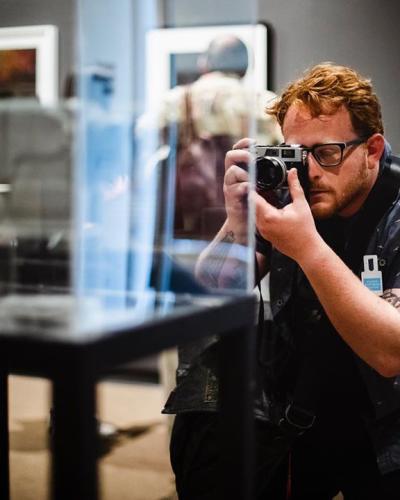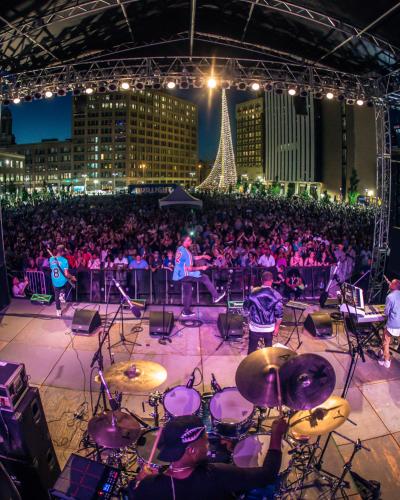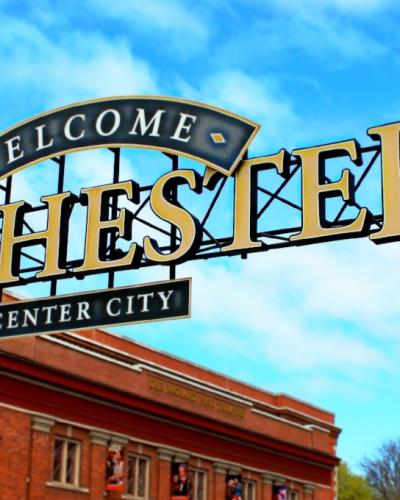The achievements, struggles, triumphs, pain and overall narrative of African Americans are ingrained in American culture, and no matter where you’re from or who you are, there’s always the opportunity to celebrate in those victories and learn from those battles. February is Black History Month, and it’s a great opportunity to look back at how far the nation has come in the acknowledgment and representation of African Americans, while continuing to create a more inclusive world ahead.
This blog will take you on a journey that’s twofold:
We’ll highlight some of the prominent Black figures in the areas of civil rights and activism, science, film and entrepreneurship—to remind you of (or introduce you to) the impact Black figures have made in various facets of American history and culture.
Then, we’ll connect these themes to landmarks in Rochester that you can experience for yourself—this month, and all year long.
Civil Rights and Activism
From fighting to be freed from slavery in the 18th and 19th centuries, to marching through the Civil Rights Movement in the 1950s and 1960s, to continuing the fight for justice today, racial equality has been an ongoing plight in the Black community that has seen many pillars at the forefront.
Modern-day activists like Van Jones and Melanie Campbell continue to underscore the principles outlined by leaders like Martin Luther King, Jr. and Fannie Lou Hamer. And in the 1800s, pioneers like Sojourner Truth and Harriet Tubman cemented their legacy for being unapologetically outspoken against slavery.
An important figure in Black history—one with ties to Rochester—is Frederick Douglass: the abolitionist, orator and publisher who called Rochester his home from 1847 to 1872.
In Rochester, he published his newspapers, the North Star and Frederick Douglass’ Paper, assisted friends Amy and Isaac Post in Underground Railroad activities, hosted runaway slaves in his own home, gave speeches, supported women’s suffrage alongside suffragist Susan B. Anthony and much more before moving to Washington D.C. in 1872.
There are a few great ways to retrace the Douglass legacy in Rochester:
- Take the self-guided Frederick Douglass Walking Tour
- Learn more about Frederick Douglass and Rochester’s ties to the Underground Railroad on an AKWAABA tour
- Visit Frederick Douglass’ final resting place at Mount Hope Cemetery
- Check out Narrative of the Life of Frederick Douglass at the Rochester Public Library
Science
Many notable Black figures have made groundbreaking strides in the field of science and medicine: Vivien Thomas developed techniques and tools that would lead to today’s modern open heart surgery, Katherine Johnson was a mathematician who calculated and analyzed the flight paths of many spacecraft during her more than three decades with the U.S. space program (perhaps you’ve seen her portrayed in the film Hidden Figures), and Mae C. Jemison became the first Black female astronaut to travel to space.
Another history-maker in the field of science is Dr. Walter Cooper. If his name sounds familiar, it’s because his presence is strong in Rochester: He served on the New York State Board of Regents, and in 2010, the Rochester City School #10 was renamed the Dr. Walter Cooper Academy School #10.
Dr. Cooper was the first African American to earn a Ph.D. in physical chemistry from the University of Rochester, and he notably served as a research scientist at Eastman Kodak for 30 years. He was also awarded the Frederick Douglass Medal from the University of Rochester for his lifelong involvement in civil rights. Dr. Cooper’s contributions to the civil rights movement included becoming a founding member of Action for a Better Community in Rochester, co-founder of the National Urban League’s Rochester chapter and president of the NAACP Rochester chapter.
Explore Rochester’s museums and science centers and tap into your inner scientist:
- Visit the Rochester Museum & Science Center. Relevant exhibits currently on display include Flight to Freedom: Rochester’s Underground Railroad, Take It Down! Organizing Against Racism, and Objectively Racist: How Objects and Images Perpetuate Racism… And What We Can Do To Change It.
- Visit the George Eastman Museum. The exhibit currently on view is Joshua Rashaad McFadden: I Believe I’ll Run On, which chronicles of the intimacies of Black life in the United States as McFadden’s practice asserts the humanity of Black Americans.
- The Strong Museum has launched a new online exhibit— Re-Play: The First Fifty Years of Hip-Hop Fun. The exhibit explores hip-hop as a site of play and examines its cultural impact on playthings.
Film
Give yourself five seconds and you could probably name five Black actors or actresses, right off the bat. You could probably go even further and name directors and producers. That may be easy to do now, but it has been (and continues to be) an ongoing struggle for inclusion in the film industry. Dating back to the 19th and 20th centuries, racial discrimination made it difficult for Black actors and actresses to shine outside of stereotypical, discriminatory or typecast roles.
But throughout history, notable Black actors, actresses and productions have emerged and are more frequently awarded for their talents: Hattie McDaniel was the first Black woman to win an Academy Award; Sidney Poitier was the first Black actor and Bahamian to win the Academy Award for Best Actor; and the 2018 film Black Panther—co-starring Winston Duke, who attended Brighton High School in Rochester—became the highest-grossing film directed by a Black filmmaker.
Another notable Black entertainer with roots in Rochester is Broadway, television and film actor, Taye Diggs. He attended the School of the Arts, and in 2021, surprised his alma mater to announce they would receive $75,000 for their classrooms.
The Little Theatre’s Black Cinema Series features contemporary independent films and highlights Black perspectives and filmmakers. Post-film panel discussions include community experts and filmmakers. Friday, February 11 is the screening and panel discussion of A Warm December, starring and directed by Sidney Poitier.
Entrepreneurship
Just as with film stars, it may be easy to name several Black entrepreneurs—Oprah Winfrey may come to mind, or rapper Jay-Z who has parlayed his musical career into a profitable business brand—but with there being such a long history of Black people being discriminated against, one can understand the challenges African Americans would have faced to own their own business. But through all of this, Black entrepreneurs did exist throughout history:
Madame C.J. Walker, creator of her own haircare line for Black women, has been credited as America’s first female self-made millionaire. Harriet Tubman, well-known as a conductor on the Underground Railroad (who made frequent stops in Rochester), was also an entrepreneur and businesswoman—when she settled in nearby Auburn, NY, she raised and sold pigs, cream and butter, eggs and vegetables, and bartered with neighbors and Native American women for household items she needed.
Today, Black entrepreneurship is no longer the novelty that it once was, and there’s always an opportunity to support Black-owned businesses. Doing so builds up and empowers communities, creates jobs and opportunities and closes the racial wealth gap.
Here are just some of Rochester’s Black-owned businesses to shop from (and stay tuned for an expanded roundup in another post later this month):
- Bold and Gritty
- Cluck if You Buck
- Equal Grounds Coffee House
- Honey B Home & Essentials
- IslandFit
- Island Wraps
- Nothing Bundt Cakes
- Panther Graphics
- Peppa Pot
- Red White and Brew of Rochester
- ROC City Ramen
Special thanks to Jessica Lewis of LáLew Public Relations and Break the Ice Media for their contributions to this blog.




